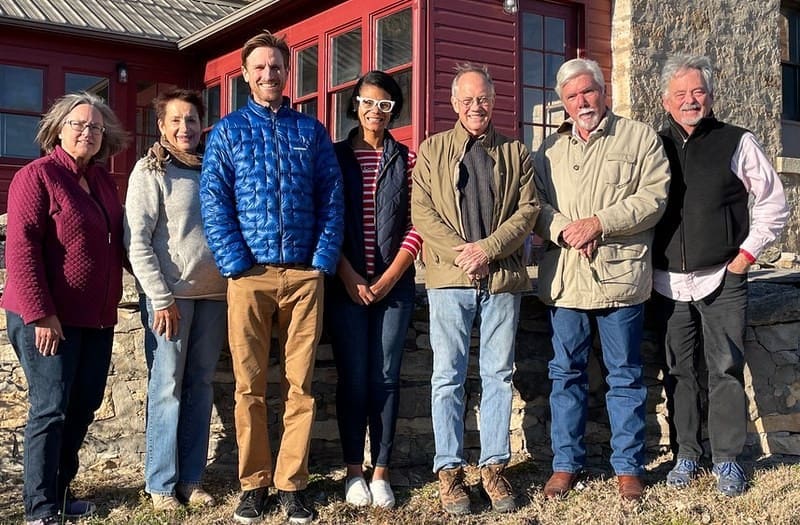By Ron Wilson, director of the Huck Boyd National Institute for Rural Development at Kansas State University
“All these things happened at Mount Mitchell,” stated one historian: Indians. Cowboys. Settlers. Bleeding Kansas. The Underground Railroad.
Mount Mitchell in Wabaunsee County was witness to all those elements of early Kansas history. Today we’ll learn about this historic landmark in the Flint Hills of rural Kansas.
Michael Stubbs is founder and active member of the group that cares for the historic Mount Mitchell Heritage Prairie Park. Stubbs grew up in Topeka. His grandfather took him fishing in the Flint Hills and he dreamed of having a place in the country.
He also found a strong interest in history. “I had a wonderful eighth grade history teacher named Ron Olsen who sparked my historical interests,” Stubbs said. “My assignment for his class was a history paper, and I wrote mine about Harriet Tubman.”
After he grew up, Michael took a position as a film location manager. He worked with Hollywood movie companies to find locations where they could record movies, and then he helped to produce them.
His childhood dream was realized when he was able to purchase a place between Eskridge and Alma. After that, he divided his time between southern California and Kansas. He also got involved in the Kansas State Historical Society.
In 1999, while doing research on the sesquicentennial of Kansas territory, he learned about a historic Wabaunsee County landmark known as Mount Mitchell.
Before the Civil War, abolitionist William Mitchell came to Kansas to support the anti-slavery movement and settled in Wabaunsee County. He actively participated in the Underground Railroad, helping enslaved people move to freedom.
Many years later, their youngest son chose to honor his father by donating land to the Kansas State Historical Society for a park. That land included a high hill with a magnificent view over the valley. It was called Mount Mitchell.
However, the park never got built. By the 2000s, the historical society was considering getting rid of the property. Wabaunsee County citizens rallied to save it. With the support of the Mitchell family, this group of citizens successfully got the land transferred into local control and created the Mount Mitchell Heritage Prairie Park. This group called themselves the Mount Mitchell Prairie Guards.
Not only do they maintain the park, the Prairie Guards have been able to raise money to purchase adjoining property and expand it.
“We had a great response from the community and were able to pay off the mortgage in two years,” Stubbs said. They built a new access road and parking area, installed water and electricity, and put up new educational display panels.
Today, Mount Mitchell Prairie Guards members are Brian Peterson, Christian Bishop, Michelle Crisler, Christy Crenshaw, Bruce Waugh, John Hund, Susan Adams, Michael Stubbs, and Mitchell family descendant Kate Mitchell Buster.
“Our whole mission is to preserve this history,” Stubbs said. It’s a multi-faceted history, beginning with the Native American tribes who lived in the region.
“The Native Americans have a 12,000 year old history here,” Stubbs said.
After European settlement, the Underground Railroad became active. The Mitchell’s log cabin, which once served as a refuge for escaping slaves, is part of the home that stands just north of the park. “All these things happened at Mount Mitchell,” Stubbs said.
Other aspects include the ranching, geology and landscape of the tallgrass prairie itself and much more. The park now includes walking loops and interpretive panels. It is open to the public year-round daily, from dawn to dusk.
Mount Mitchell Heritage Prairie Park is located between Wamego and Alma on Highway 99. It is approximately three miles east of the rural community of Wabaunsee, population 104 people. Now, that’s rural.
On June 21, a special celebration will be held at Mount Mitchell to commemorate the successful conclusion of the most recent education expansion project. For more information, see www.mountmitchellprairie.org.
Cowboys and Indians, Bleeding Kansas and the Underground Railroad. All of these elements are part of Mount Mitchell’s history.
We commend the many volunteers who are making a difference by helping preserve this history, among whom is Michael Stubbs who said: “All these things happened at Mount Mitchell.”
Audio and text files of Kansas Profiles are available at https://www.huckboydinstitute.org/kansas-profiles. For more information about the Huck Boyd Institute, interested persons can visit http://www.huckboydinstitute.org.













